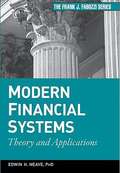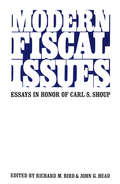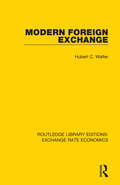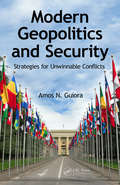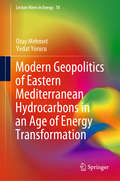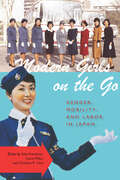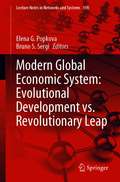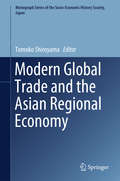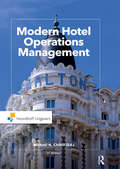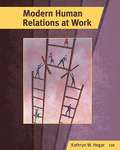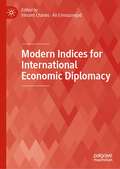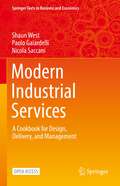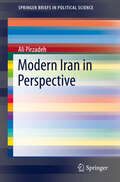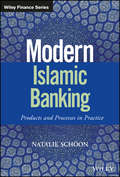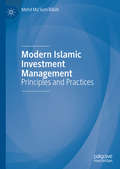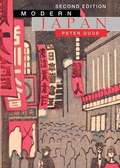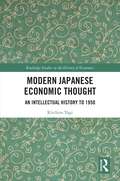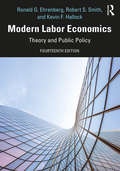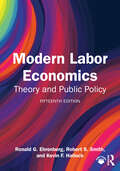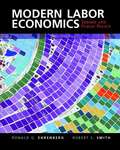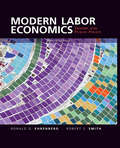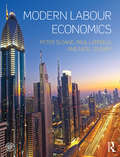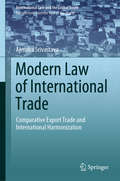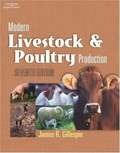- Table View
- List View
Modern Financial Systems
by Neave Edwin H.A valuable guide to the essential elements of modern financial systems This book offers you a unified theory of modern financial system activity. In it, author Edwin Neave distills a large body of literature on financial systems, the institutions that comprise the systems, and the economic impacts of the systems' operation. Through non-technical summaries, Neave provides you with a primer on how financial systems work, as well as how the many parts of any financial system relate to each other. He does so in a straightforward manner, with an emphasis on economic principles and the relationship between various aspects of financial system activity. Discusses financial governance and explains how financial markets and institutions complement each other Identifies the economic forces at work within financial systems and explores how they determine system organization and change Offers a theoretical survey of financial activity and its application to numerous practical situations Explains both static financial system organization and the dynamics of financial system evolution Following a non-technical approach, this book skillfully explores how financial systems work, as well as how the many parts of any financial system relate to each other.
Modern Fiscal Issues: Essays in Honour of Carl S. Shoup
by John Head Richard BirdThe contributors to this work, all leading economists in their own right, are a few of the many colleagues, former students, and friends of Carl Shoup who have benefitted from his many years as a leading teacher and scholar of public finance. They dedicate this book to their mentor on the occasion of his seventieth birthday, in recognition of his intellectual probity and wide influence on thinking about public finance throughout the last forty years.Matching the breadth of interest of Professor Shoup's life-long work in the field, this collection of essays covers the range of modern thinking on public finance from theoretical concepts such as public goods to eminently practical fiscal issues like value added tax. The traditional but still relevant fiscal issues--government accounting, international taxation, taxation in developing countries, metropolitan fiscal problems, income taxation, and tax structure--are discussed along with new concerns such as modern public expenditure theory and environmental theory.The book will be a useful addition to university and college libraries and will prove invaluable to public finance scholars and others interested in modern thinking on vital fiscal issues.
Modern Foreign Exchange (Routledge Library Editions: Exchange Rate Economics)
by Hubert C. WalterOriginally published in 1923. This book describes the working of the exchanges, and explains post-war fluctuations. It describes bills, documentary and blank credits, the mechanism of exchange trading and money market; and explains inflation, floating debts, purchasing power parity, international indebtedness and stabilisation.
Modern Geopolitics and Security: Strategies for Unwinnable Conflicts
by Amos N. GuioraThe transformation from traditional war between nation-states to conflict between nation-states and nonstate actors requires decision makers, policy analysts, military commanders, intelligence officials, and legislators to answer the question: is there a strategy for an unwinnable conflict? This book draws on the author's extensive experience in counterterrorism, negotiation, and the implementation of the Oslo Peace Process, with his more recent work in academia. The book uses an interdisciplinary case study model to illustrate valuable lessons learned and best practices in strategic analysis and decision making in geopolitics. It examines international relations, international law, and negotiation/intervention as they pertain to recent and historical examples of global crises and security.
Modern Geopolitics of Eastern Mediterranean Hydrocarbons in an Age of Energy Transformation (Lecture Notes in Energy #78)
by Ozay Mehmet Vedat YorucuThis book provides an in-depth assessment of the modern geopolitics of hydrocarbon resources in the territorial waters of the Eastern Mediterranean, highlighting the current conflicts and disputes in the maritime territories of Egypt, Israel, Lebanon, Cyprus, and Turkey. Further, these geopolitical aspects are analyzed within the broader context of the tensions between and competing interests of big powers such as the USA, Russia, and the European Union.To what extent can major powers influence regional actors and guide them toward rational outcomes? To what extent can economic self-interest contain nationalistic impulses? What are the most practical and sustainable ways of promoting win-win scenarios? This book focuses on such questions and presents a number of clear policy guidelines to help the conflict-laden Eastern Mediterranean region gain a more peaceful and sustainable footing for the greater benefit of the peoples living there.
Modern Girls on the Go: Gender, Mobility, and Labor in Japan
by Laura Miller Alisa Freedman Christine R. YanoThis spirited and engaging multidisciplinary volume pins its focus on the lived experiences and cultural depictions of women's mobility and labor in Japan. The theme of "modern girls" continues to offer a captivating window into the changes that women's roles have undergone during the course of the last century. Here we encounter Japanese women inhabiting the most modern of spaces, in newly created professions, moving upward and outward, claiming the public life as their own: shop girls, elevator girls, dance hall dancers, tour bus guides, airline stewardesses, international beauty queens, overseas teachers, corporate soccer players, and even female members of the Self-Defense Forces. Directly linking gender, mobility, and labor in 20th and 21st century Japan, this collection brings to life the ways in which these modern girls—historically and contemporaneously—have influenced social roles, patterns of daily life, and Japan's global image. It is an ideal guidebook for students, scholars, and general readers alike.
Modern Global Economic System: Evolutional Development vs. Revolutionary Leap (Lecture Notes in Networks and Systems #198)
by Elena G. Popkova Bruno S. SergiThis proceedings book reflects the alternative way of development of the modern global economic system. It sets evolutionary development in opposition to revolutionary leap. The search for the best way to develop the world economy in the present and future is carried out. The social environment and the human-centered development of the modern global economic system have been explored. The features of training of personnel for the modern global economic system through the development of vocational education and training have been studied. Sustainable development, energy and food security have been identified as significant milestones of the progress of the modern global economic system. Innovations and digital technologies have been suggested as the drivers of growth and development of the modern global economic system. Consideration has been given to the institutional framework and legal groundwork for the development of the modern global economic system. The fundamentals have been identified and recommendations have been put forward for improving governmental regulation, financial and capital investment support for integration in the modern global economic system. The book includes the best works based on the results of the 22nd International Research-to-Practice Conference “Current Issues of the Global Economy” which was held on June 19, 2020, at the Peoples’ Friendship University of Russia (PFUR) (Moscow, Russia) and the 14th National Research-to-Practice Conference “A New Paradigm of Social and Economic Development in the Age of Intelligent Machines,” which was held on May 14–16, 2020 (Nizhny Novgorod, Russia), VIII International Research-to-Practice Conference “Multipolar Globalization and Russia,” which was held on May 21–23, 2020 (Rostov-on-Don, Russia), III All-Russian Research-to-Practice Conference “Power, Business, and Education: The Ascent to Man,” which was held on May 21–22, 2020 (Krasnoyarsk, Russia), International Research-to-Practice Conference “Current Issues and Ways of Industrial Development: Engineering and Technologies,” which was held from September 28, 2020, till October 1, 2020 (Komsomolsk-on-Amur), and the 15th National Research-to-Practice Conference “New Models of Behavior of Market Players in the Conditions of Digital Economy,” which was held on October 29–30, 2020, at Ufa State Oil Technical University, Institute of Economics and Service (Ufa, Russia). The target audience of the book consists of scholars studying the features of development of the global economic system at the present stage and the prospects for its future progress.
Modern Global Trade and the Asian Regional Economy (Monograph Series of the Socio-Economic History Society, Japan)
by Tomoko ShiroyamaThis volume undertakes the important task of envisioning a regional history of Asia based on its unique internal characteristics, going beyond the usual West/non-West dichotomy. The “regional trade zone of modern Asia” was debated in the 1980s. Since then, Japanese historians of the socioeconomic history of Asia have explored how the traditional trade relations that had developed over the centuries in Asia responded to the so-called Western impacts in the mid-nineteenth century, including the opening of ports and tariff reduction under free trade regimes and the advance in transportation technology. Against this academic background, the four chapters in this volume examine how overseas Chinese, some of the key actors in regional and local trade, dealt with their Western counterparts, and how Asian commodities penetrated other parts of the world through the newly created web of global commerce. The book reviews discuss theoretical issues to explore various connections among and comparisons of the economies in the region. This volume provides readers with critical insights into the Asian region in the past and present by investigating the long-term trajectory of its linkages to the global economy.
Modern Hotel Operations Management
by Conrad Lashley Michael Chibili Shane de Bruyn Latifa Benhadda Saskia Penninga Bill RowsonA comprehensive and wide-ranging introduction to operational hotel management, this textbook brings together business administration, management and entrepreneurship into a complete overview of the discipline. Essential reading for students of hospitality management, the book also benefits from online support materials.
Modern Human Relations at Work (11th Edition)
by Kathryn W. HegarThis book includes many practical examples and techniques, as well as experiential and application-oriented exercises that show you how human relations concepts and skills can increase productivity and job satisfaction in the workplace. The 11th edition's 14 chapters are brimming with self-assessment and self-study tools that make learning fun, insightful, and useful.
Modern Indices for International Economic Diplomacy
by Ali Emrouznejad Vincent CharlesComposite indices are used by national and international organisations, as well as governments and corporations, to track various performance aspects of a country's economy and its people, evaluate progress, and engage constructively in policy dialogue; and they have long proven useful as communication tools and inputs into decision-making and policymaking. Modern Indices for International Economic Diplomacy compiles a spectrum of relevant indices for development and well-being used in benchmarking across nations, namely the OECD Better Life Index, the Gini Index, the Gender Equality/Inequality Index, the International Energy Security Risk Index, the Big Mac Index, the Country Risk Index, the Corruption Perceptions Index, and the Global Terrorism Index. The book will be relevant to practitioners, policymakers, researchers, and students interested in the topic of international economic relationships.
Modern Industrial Services: A Cookbook for Design, Delivery, and Management (Springer Texts in Business and Economics)
by Shaun West Paolo Gaiardelli Nicola SaccaniThis open access book is an outcome of several years of research, practice, and teaching experience of the authors on the challenges that underpin the successful switch to services for manufacturing firms. Ideal for a student as well as a practitioner, the book describes the industrial services ecosystem, the barriers and challenges, and a roadmap for building service excellence. Curated cases are used to describe the current approaches in practice to overcome the barriers. The book also provides several tools, each with a short introduction, that the authors have used successfully in projects to help overcome the servitization barriers. Many of these tools are from management, design thinking, or service design. The service excellence roadmap is based on the development methodology and helps current and future business leaders to create their own individual roadmaps.
Modern Iran in Perspective (SpringerBriefs in Political Science)
by Ali PirzadehThis book highlights fundamental, but often neglected, issues important for a better understanding of present-day Iran. It underlines the idea that the most effective means for a nation to meet challenges and practices of the modern era lies with the fundamental values and norms that resonate with its inhabitants.This book is meant to be a companion to the author’s published book Iran Revisited: Exploring the Historical Roots of Culture, Economics, and Society that expands upon that book’s ideas, without repeating its theoretical reasoning. Its goal is to offer a better understanding of the current and evolving situations in Iran. In this regard, the author tried to clarify his position through a host of suggestions, most notably, the need to consider social rights as the bare minimum but extremely imperative criteria in our contemporary discourse for the betterment of our society. These rights, he argues, are the most fundamental tenets of any community that strives to succeed and flourish. In this context, the underlying discussion rests on the following claim: the most persisting problems in Iran are the outcomes of the gradual regression of the people’ mindset that persistently overlooked their heritage and value system in favor of imitating ideas that were/are neither compatible with their culture and history, nor applicable to the country’s socioeconomic conditions. The author, therefore, presumed that these predicaments are self-inflicted: they were neither caused by a specific state, nor belong to a historical period, or individual(s); they cannot be characterized by political or economic terminologies, but are firmly rooted in people inability to recognize that the most vital principle in developing and propelling a nation forward is the existence of a unified people.
Modern Islamic Banking
by Natalie SchoonA complete, detailed guide to modern Islamic banking fundamentals Modern Islamic Bankingprovides a comprehensive, up-to-the-minute guide to the products, processes and legal doctrines underlying Islamic banking. Written by a pioneering practitioner in the field, this book provides thorough guidance and expert-level perspective on the principles and applications of this alternative-banking model. You'll begin by learning the fundamentals, vocabulary and key concepts of Islamic banking, then explore key products including istisna'a, murabaha, musharaka, ijara, sukuk, and salam. Coverage then moves into practical applications of Islamic products to a variety of contexts including asset management, treasury, risk management, venture capital, SME finance, micro-finance and taxation. Regulatory frameworks are discussed in detail, including extensive coverage of post-financial crisis Islamic bank valuation. Islamic banking has experienced rapid growth over the past decade, a trend that is set to continue given the sector's successful weathering of the financial crisis. This book brings you up to speed on this alternative way of banking, and shows you how it applies within your own current practices. Understand the principles of Islamic banking and finance Learn the products, vocabulary and key concepts of the field Consider the applications in a variety of financial contexts Explore the regulatory frameworks and valuation of Islamic banks Islamic banking practices differ from Western banking in fundamental ways -- it's these differences that shielded the sector during the global crisis, but they also require practitioners to understand a whole new set of rules, products and practices. Modern Islamic Banking gives you a solid understanding of the fundamentals and expert insight into modern practical applications.
Modern Islamic Investment Management: Principles and Practices
by Mohd Ma'Sum BillahIslamic finance has grown exponentially since 1963 and has reached more than 70 countries around the world with the asset size of about $2.5 trillion. The Islamic investment system today comprises of both asset-backed and asset-based offerings. There is an evidence of sustained demand for Islamic investment in the global market among both Muslim and non-Muslim investors with demand outstripping supply and management. This book is a timely guide to understanding the paradigm of Islamic investment and its application in the contemporary investment reality, and will be of particular interest to academia, industrialists, professionals, investors, investment managers, product designers, students, decision makers and policymakers globally in the field of investment.
Modern Japan
by Peter DuusJapan's rise to world prominence --first as an aggressively westernizing Asian nation, then as a major imperialist power, and finally its resurgence as a postwar economic giant. The text has been completely revised to reflect recent events including Japan's role in WWII, women's history, and Japan's rise to become a leading economic power. The text is 1) The Fall of the Tokugawa On 2) The Pursuit of Wealth and Power, 1868-1905 3) Political Change, Crisis, and War, 1905-1945 4) Peace, Prosperity, and Stability
Modern Japanese Economic Thought: An Intellectual History to 1950 (Routledge Studies in the History of Economics)
by Kiichiro YagiSince the mid-19th century, Japan has made remarkable strides in industrialization. Beginning with the economic vision of Miura Baien in the 18th century, and employing a detailed comparison with the West, this book delves into the economic thought of the scholars who have played a pivotal role in Japan’s modernization process. The author takes Fukuzawa Yukichi’s theory of ‘civilization’ as the standard measure of Japan’s modernization and compares it with differing visions from various critics whose research focused on rural poverty and social problems, such as Maeda Masana, early socialists, Yanagita Kunio and Kawakami Hajime. Further, the book explores new liberalism (Ishibashi Tanzan, Fukuda Tokuzo) and Marxism (Yamada Moritaro, Uno Kozo) in the 1920s and 1930s. After discussing the dilemmas faced by economists during wartime (Takata Yasuma, Ryu Shintaro, Shibata Kei), the author concludes this intellectual history with the country’s post-1945 democratic reforms and their early demise. This book is valuable reading for students and researchers of Japan’s intellectual history. However, due to the book’s comparative perspective, as well as the universality of the modernization experience, it will also appeal to students and researchers of the history of economic thought and modern intellectual history.
Modern Labor Economics: Theory and Public Policy
by Robert Smith Kevin F. Hallock Ronald G. EhrenbergModern Labor Economics: Theory and Public Policy, now in its fourteenth edition, continues to be the leading text for one-semester courses in labor economics at the undergraduate and graduate levels. It offers a thorough overview of the modern theory of labor market behavior and reveals how this theory is used to analyze public policy. Designed for students who may not have extensive backgrounds in economics, the text balances theoretical coverage with examples of practical applications that allow students to see concepts in action. The authors believe that showing students the social implications of the concepts discussed in the course will enhance their motivation to learn. Consequently, this text presents numerous examples of policy decisions that have been affected by the ever-shifting labor market. This new edition continues to offer the following: a balance of relevant, contemporary examples coverage of the current economic climate an introduction to basic methodological techniques and problems tools for review and further study This fourteenth edition presents updated data throughout and a wealth of new examples, such as the impact of COVID-19 lockdowns, gig work, nudges, monopsony power in the technology industry, and the effect of machine learning on inequality. Supplementary materials for students and instructors are available on the book’s companion website.
Modern Labor Economics: Theory and Public Policy
by Kevin F. Hallock Ronald G. Ehrenberg Robert S. SmithModern Labor Economics: Theory and Public Policy, now in its fifteenth edition, continues to be the leading text for one-semester courses in labor economics at the undergraduate and graduate levels.It offers a thorough overview of the modern theory of labor market behavior and reveals how this theory is used to analyze public policy. Designed for students who may not have extensive backgrounds in economics, the text balances theoretical coverage with examples of practical policy applications that allow students to see concepts in action. The authors believe that showing students the social implications of the concepts discussed in the course will enhance their motivation to learn. Consequently, this text presents numerous examples of policy decisions that have affected, and been affected by, the ever-shifting labor market.This new edition continues to offer the following: a balance of relevant, contemporary examples coverage of the current economic climate an introduction to basic methodological techniques and problems tools for review and further study This fifteenth edition presents updated data and examples throughout and offers greater coverage of monopsonistic labor markets (including anti-trust regulations and rulings), the economics of education, the gender pay gap, recent developments in unions, and unemployment, plus new material on the work-from-home trend and AI. Supplementary materials for students and instructors are also available.
Modern Labor Economics: Theory and Public Policy
by Ronald G. Ehrenberg Robert S. SmithDesigned for students who may not have extensive backgrounds in economics, the text balances theoretical coverage with examples of practical applications that allow students to see concepts in action.
Modern Labor Economics: Theory and Public Policy
by Ronald G. Ehrenberg Robert S. SmithFor one-semester courses in labor economics at the undergraduate and graduate levels, this book provides an overview of labor market behavior that emphasizes how theory drives public policy.Modern Labor Economics: Theory and Public Policy, Twelfth Edition gives students a thorough overview of the modern theory of labor market behavior, and reveals how this theory is used to analyze public policy. Designed for students who may not have extensive backgrounds in economics, the text balances theoretical coverage with examples of practical applications that allow students to see concepts in action. Experienced educators for nearly four decades, co-authors Ronald Ehrenberg and Robert Smith believe that showing students the social implications of the concepts discussed in the course will enhance their motivation to learn. As such, the text presents numerous examples of policy decisions that have been affected by the ever-shifting labor market.This text provides a better teaching and learning experience for you and your students. It will help you to: Demonstrate concepts through relevant, contemporary examples: Concepts are brought to life through analysis of hot-button issues such as immigration and return on investment in education. Address the Great Recession of 2008: Coverage of the current economic climate helps students place course material in a relevant context. Help students understand scientific methodology: The text introduces basic methodological techniques and problems, which are essential to understanding the field. Provide tools for review and further study: A series of helpful in-text features highlights important concepts and helps students review what they have learned.
Modern Labour Economics
by Paul Latreille Peter Sloane Nigel O'LearyLabour economics as a discipline has changed dramatically in recent years. Gone are the days of a "job for life". These days, firms and employees are part of a less regulated, more fluid, and more international labour market. Knowledge, training, human resource development and human capital are all major factors on the contemporary scene. This new textbook is the first properly international textbook to reflect these swingeing changes. Its key areas of concentration include: the increasing importance of human capital including education and occupational choice the major subdivision of personnel economics including economic inactivity and absenteeism comparative cross country studies and the impact of globalization and migration on national labour markets equal opportunities and issues of discrimination on the basis of race, gender and disability conflict at work, including both strikes and, uniquely, individual disputes. Other issues explored include the supply and demand of labour, wages, the current role of trade unions, bargaining and conflict, and working time. The book is written in a clear, accessible way with some mathematical exposition, reflecting the text’s grounding in current microeconomic theory. The book also contains case studies designed to illuminate theoretical concepts and exercises and discussion questions to test the students understanding of the various concepts outlined in the text.
Modern Law of International Trade: Comparative Export Trade and International Harmonization (International Law and the Global South)
by Ajendra SrivastavaThis book presents a comprehensive and systematic study of the principal aspects of the modern law of international commercial transactions. Based on diverse sources, including legislative texts, case law, international conventions, and a variety of soft-law instruments, it highlights key topics such as the international sale of goods, international transport, marine insurance, international finance and payments, electronic commerce, international commercial arbitration, standard trade terms, and international harmonization of trade laws. In focusing on the private law aspects of international trade, the book closely analyzes the relevant statutes, case law and the European Union (EU) and international uniform law instruments like the Rome I Regulation, the UN Convention on the Contracts for the International Sale of Goods (CISG), UNCITRAL Model Laws; non-legislative instruments including restatements such as the UNIDROIT Principles on International Commercial Contracts, and rules of business practices codified by the ICC such as the Arbitration Rules, UCP 600 and different versions of the INCOTERMS. The book clearly explains the key concepts and nuances of the subject, offering incisive and vivid analyses of the major issues and developments. It also traces the evolution of the law of international trade and explores the connection between the lex mercatoria and the modern law. Comprehensively examining the issue of international harmonization of trade laws from a variety of perspectives, it provides a detailed account of the work of major players in the field, including UNCITRAL, UNIDROIT, ICC, and the Hague Conference on Private International Law (HCCH). Adopting the comparative law method, this book offers a critical analysis of the laws of two key jurisdictions—India and England—in the context of export trade. In order to stimulate discussion on law reform, it explains the similarities and differences not only between laws of the two countries, but also between the laws of India and England on the one hand, and the uniform law instruments on the other. Given its breadth of coverage, this book is a valuable reference resource not only for students in the fields of law, international trade, and commercial law, but also for researchers, practitioners and policymakers.
Modern Livestock & Poultry Production
by James R. GillespieThis text for vocational-technical students emphasizes readability, organization, and hands-on activities. Sections cover the livestock industry, feeding and nutrition, animal breeding, and the production of various stock including beef cattle, poultry, llamas, and bison. This seventh edition adds information on anatomy and physiology and on appropriate work habits, and includes student learning activities. Gillespie is a retired teacher of agricultural education. Annotation (c)2003 Book News, Inc. , Portland, OR (booknews. com)
Modern Livestock & Poultry Production
by James R. GillespieModern Livestock and Poultry Production, seventh edition is the textbook students and instructors turn to for thorough coverage of the animal agriculture industry. For each of the many species discussed in the text, students will find essential information about the breeds, selection of breeding stock, feeding and species management, diseases and parasites common to the species and marketing. Material is derived from the latest research and most current information about animal genetics, breeding, nutrition, biotechnology and product promotion. The text provides complete coverage of such major farm animal enterprises as beef cattle, swine, sheep, goats, horses, poultry and dairy cattle. Minor animal enterprises addressed include rabbits, bison, ratites, llamas and alpacas. Students will gain a comprehensive understanding of the livestock industry, including career opportunities.
